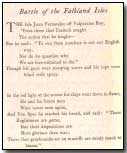Prose & Poetry - The Muse in Arms - Battle of the Falkland Isles
 First published in London
in November 1917 and reprinted in February 1918 The Muse in Arms
comprised, in the words of editor E. B. Osborne:
First published in London
in November 1917 and reprinted in February 1918 The Muse in Arms
comprised, in the words of editor E. B. Osborne:
"A collection of war poems, for the most part written in the field of action, by seamen, soldiers, and flying men who are serving, or have served, in the Great War".
Below is one of eight poems featured within the Sea Affair section of the collection. You can access other poems within the section via the sidebar to the right.
Battle of the Falkland
Isles
by I. C.
The Isle Juan Fernandez off
Valparaiso Bay,
'Twas there that Cradock sought
The action that he fought -
For he said: "To run from numbers is not our English way,
Nor do we question why
We are fore-ordained to die."
Though his guns were scooping water and his tops were blind with spray.
In the red light of the
sunset his ships went down in flame,
He and his brave men
Were never seen again,
And Von Spee he stroked his beard, and said: "Those Englishmen are game,
But their dispositions are
More glorious than war;
Those that greyhounds set on mastiffs are surely much to blame."
Then the Board of Admiralty
to Sir Doveton Sturdee said:
"Take a proper naval force
And steer a sou'west course,
And show the world that England is still a Power to dread."
Like scorpions and whips
Was vengeance to his ships,
And Cradock's guiding spirit flew before their line ahead.
Through tropic seas they
shore like a meteor through the sky,
And the dolphins in their chase
Grew weary of the race;
The swift grey-pinioned albatross behind them could not fly,
And they never paused to rest
Upon the ocean's breast
Till their southern shadows lengthened and the Southern Cross rode high.
Then Sir Doveton Sturdee said in his flagship captain's ear:
"By yon kelp and brembasteen
'Tis the Falkland Isles, I ween,
Those mollymauks and velvet-sleeves they signal land is near,
Give your consorts all the sign
To swing out into line,
And keep good watch 'twixt ship and ship till Graf van Spee appear."
The Germans like grey
shadows came stealing round the Horn,
Or as a wolf-pack prowls
With blood upon its jowls,
Their sides were pocked with gun-shots and their guns were battle-worn,
And their colliers down the wind
Like jackals trailed behind,
'Twas thus they met our cruisers on a bright December morn.
Like South Atlantic rollers
half a mile from crest to crest
Breaking on basalt rocks
In thunderous battle-shocks,
So our heavy British metal put their armour to the test.
And the Germans hurried north,
As our lightnings issued forth,
But our battle-line closed round them like a sickle east and west.
Each ship was as a pillar of
grey smoke on the sea,
Or mists upon a fen,
Till they burst forth again
From their wraiths of battle-vapour by wind and speed made free;
Three hours the action sped,
Till, plunging by the head,
The Scharnhorst drowned the pennant of Admiral von Spee.
At the end of two hours more
her sister ship went down
Beneath the bubbling wave,
The Gneisenau found her grave,
And Nurnberg and Leipzig, those cities of renown,
Their cruiser god-sons, too,
Were both pierced through and through,
There was but one of all five ships our gunners did not drown.
'Twas thus that Cradock
died, 'twas thus Von Spee was slain,
'Twas thus that Sturdee paid
The score those Germans made,
'Twas thus St. George's Ensign was laundered white again,
Save the Red Cross over all
The graves of those who fall,
That England as of yore may be Mistress of the Main.
A sandbag was a sack filled with earth from which defences were built.
- Did you know?
